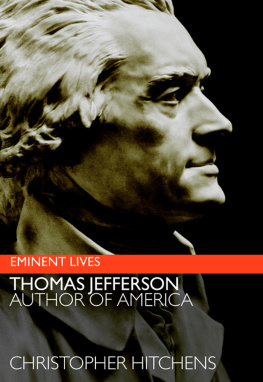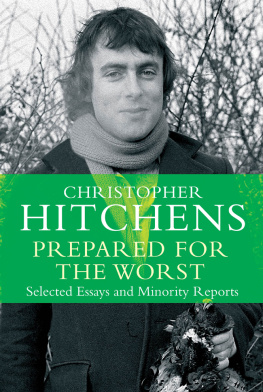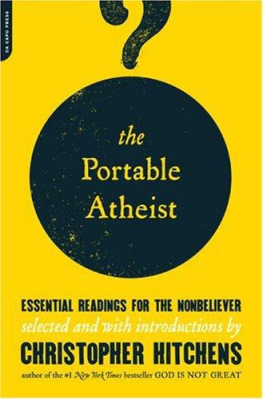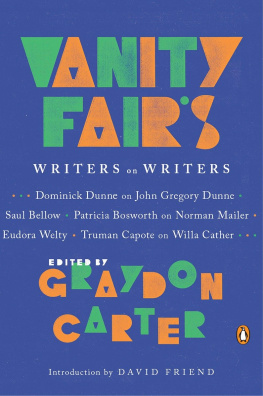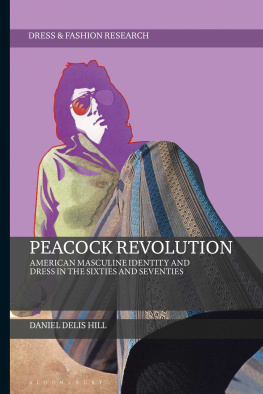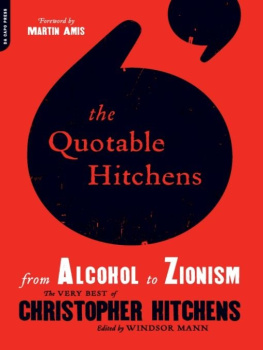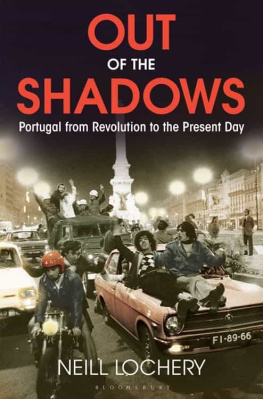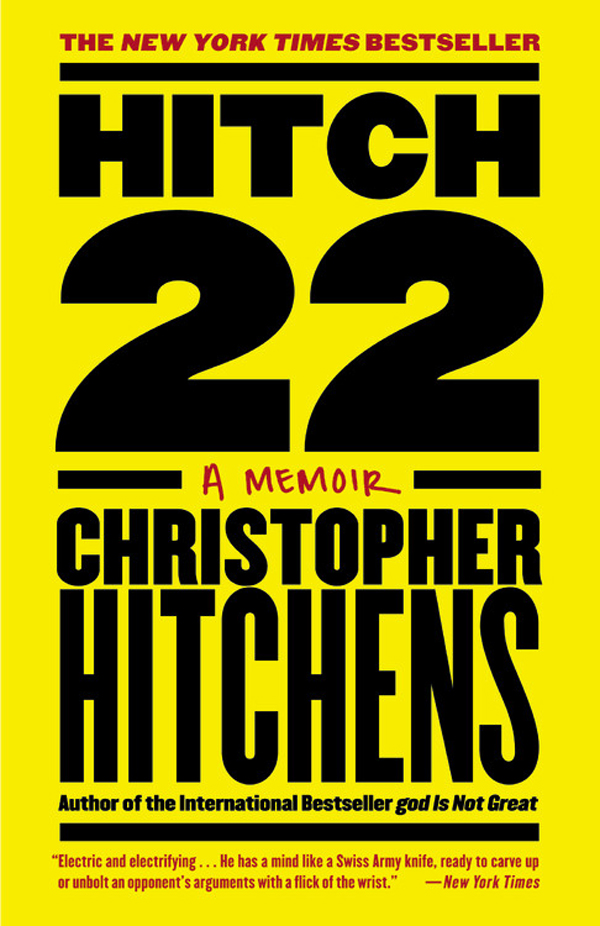For James Fenton

I can claim copyright only in myself, and occasionally in those who are either dead or have written about the same events, or who have a decent expectation of anonymity, or who are such appalling public shits that they have forfeited their right to bitch.
For those I have loved, or who have been so lenient and gracious as to have loved me, I have not words enough here, and I remember with gratitude how they have made me speechless in return.
The desires of the heart are as crooked as corkscrews
Not to be born is the best for man
The second best is a formal order
The dances pattern, dance while you can.
Dance, dance, for the figure is easy
The tune is catching and will not stop
Dance till the stars come down with the rafters
Dance, dance, dance till you drop.
W.H. Auden, Deaths Echo
We are going to die, and that makes us the lucky ones. Most people are never going to die because they are never going tobe born. The potential people who could have been here in my place but who will in fact never see the light of day outnumberthe sand grains of the Sahara. Certainly those unborn ghosts include greater poets than Keats, scientists greater than Newton.We know this because the set of possible people allowed by our DNA so massively outnumbers the set of actual people. In theteeth of these stupefying odds it is you and I, in our ordinariness, that are here.
Richard Dawkins, Unweaving the Rainbow
Ah, words are poor receipts for what time hath stole away
John Clare, Remembrances
Do not aspire to immortal life but exhaust the limits of the possible.
Pindar: Pythian iii

I HOPE IT WILL not seem presumptuous to assume that anybody likely to have got as far as acquiring this paperback re-edition of my memoir will know that it was written by someone who, without appreciating it at the time, had become seriously and perhaps mortally ill.
In any case, I believe that it might strike some readers (as it now very forcibly strikes the author) that the first three chapters, as well as many of the ensuing passages, show a strong preoccupation with impending death, or with deaths in my family. To some extent this is natural and proper in any work of autobiography. I took on the job of writing it when I was approaching and crossing the small but noticeable frontier of my sixth decade: a time when one has begun to notice the names of contemporaries on the obituary pages. When the book was published, I had just turned sixty-one. I am writing this at a moment when, according to my doctors, I cannot be certain of celebrating another birthday.
On the other hand, so to say, and thanks to the brilliance and skill of these same physicians, I could hope to live for several more years and even to find them enjoyable and profitable. How different is this, in the last analysis, from the life I was living before? One always knows that there is a term-limit to the lifespan, just as one always knows that illness or accident or incapacity, physical and mental, are never more than a single breath away.
To take this up in narrative form, and to resume the story regardless, I had been becoming aware, as the book neared completion, that I was becoming increasingly easily tired. Once or twice, people who had seen me on television wrote to express concern about my appearance. But I invariably recuperated from exhaustion without much trouble, and all my routine medical examinations found me in exceptional health for someone of my age. In any case my life is my work, and vice versa, and I have always arranged it so as to be deliberately over-stretched. I positively enjoyed traveling to writing assignments or speaking engagements, on the average of about once a week, while meeting a series of columnar deadlines. And I never lacked for friends or company, and continued to seek out both voraciously. Like the man in the old story, I sometimes laughed that if Id known I was going to live this long I would have taken better care of myself. Stories about my Bohemian lifestyle have been exaggerated, as I go on to discuss in these pages, but perhaps not by all that much. I had evolved a very productive and, to me, satisfying regime. If some of it depended a bit on cocktails and late nights of reading or argument or even (in the course of writing this book) a lapse back into the smoking habit, I thought the wager was worth it.
Thus my state of relative insouciance until the spring of 2010, when I received the advance schedule of the upcoming publicity tour for this book. It was to be a brilliant and lavish thing, extending from Australia to Britain to the United States and Canada. I take no stock in pre-cognition (its very obvious to me now that my body was trying to tell me something) but merely set down the fact that I read through the schedule and quite calmly thought: I shall never get to the end of it. Mentally, I was preparing myself to take several months off (something I have never wanted before) and book a serious appointment with a doctor. The tour began well but my system soon asserted itself: I was felled first in New York, where I learned that I should seek a cancer biopsy, and thenhaving had the biopsy and deciding to keep as many engagements as possible while I waited for the resultin Boston. My dear friend Cary Goldstein, who was with me on both occasions, is the reason why these paragraphs can be written. Ever since, I have lived from one chemotherapy application to another and, in some periods, from one painkiller to the next, while awaiting the possibility of a treatment that is specific to my own genes and my own malignancy. (I suffer from Stage Four esophageal cancer. There is no Stage Five.)
A continuous theme in Hitch-22 is the requirement, exacted by a life of repeated contradictions, to keep two sets of books. My present condition intensifies this rather than otherwise. I am forced to make simultaneous preparations to die, and to go on living. Lawyers in the morning, as I once put it, and doctors in the afternoon. One of the happier dimensions of my life, that of travel, has been foreclosed to me: a great misery. But I have found that I still possess the will to write, as well as the indispensable thing for any writer, the avid need to read. Even when attenuated by the shorter amount of time that I am conscious during each day, and circumscribed by the thought of an eventual loss of consciousness altogether, this is only a little less than I used to be quietly grateful for: the ability to earn a living by doing the two things that mean most to me.
Another element of my memoirthe stupendous importance of love, friendship, and solidarityhas been made immensely more vivid to me by recent experience. I cant hope to convey the full effect of the embraces and avowals, but I can perhaps offer a crumb of counsel. If there is anybody known to you who might benefit from a letter or a visit, do not on any account postpone the writing or the making of it. The difference made will almost certainly be more than you have calculated.
The cause of my life has been that of combating superstition, which among other things means confronting the dreads upon which it feeds. For some inexplicable reason, our culture regards it as normal, even creditable, for the godly to admonish those who they believe to be expiring. A whole tawdry edificeof fabricated deathbed conversions and moist devotional literaturehas arisen on this highly questionable assumption. Though I could have chosen to take offense (at being silkily invited to jettison my convictions when in


